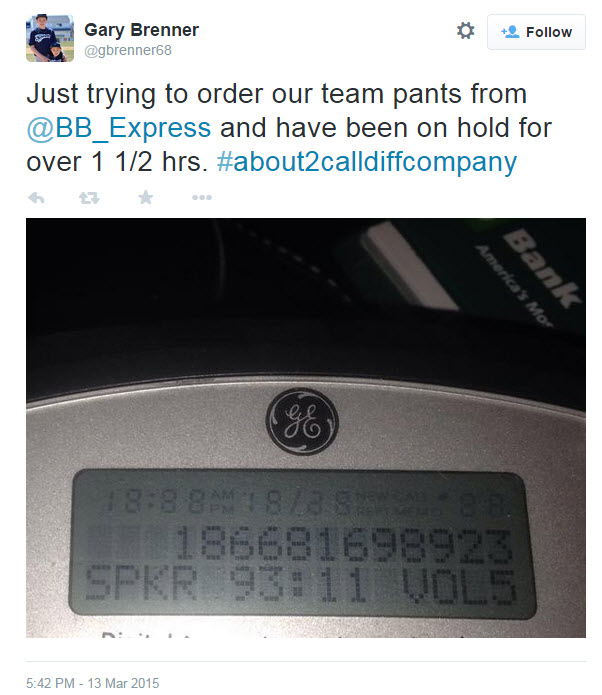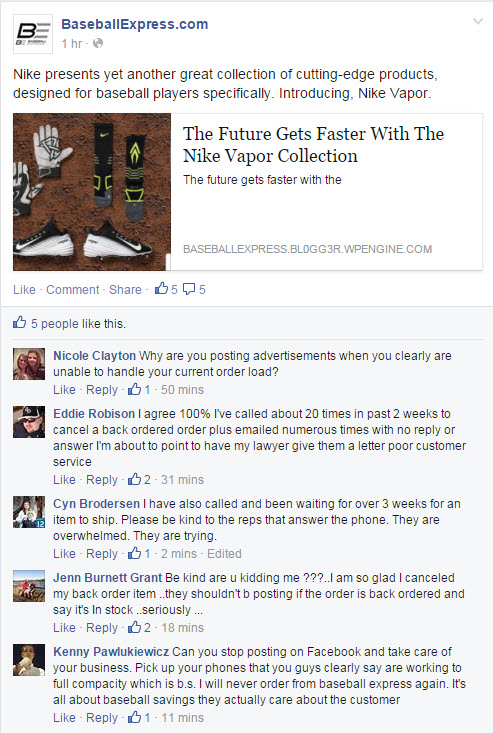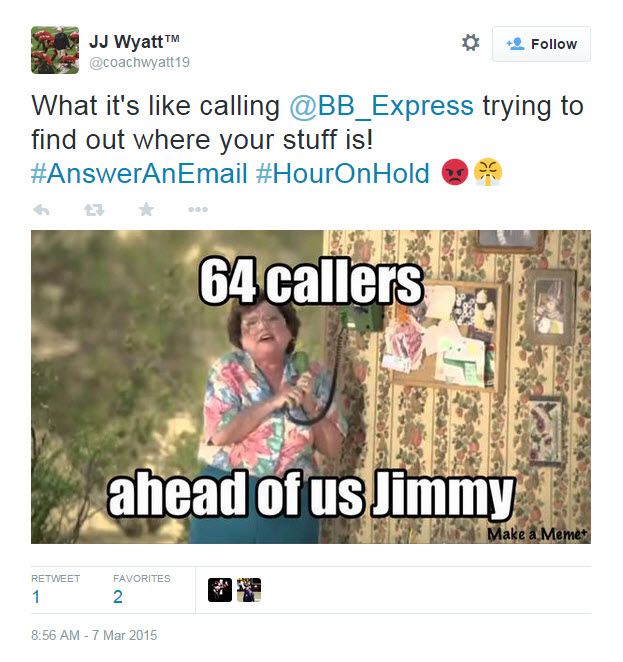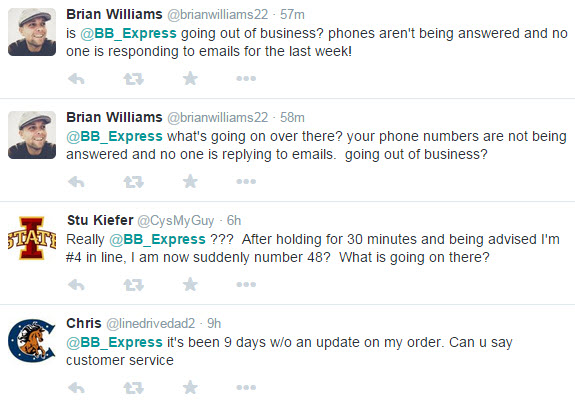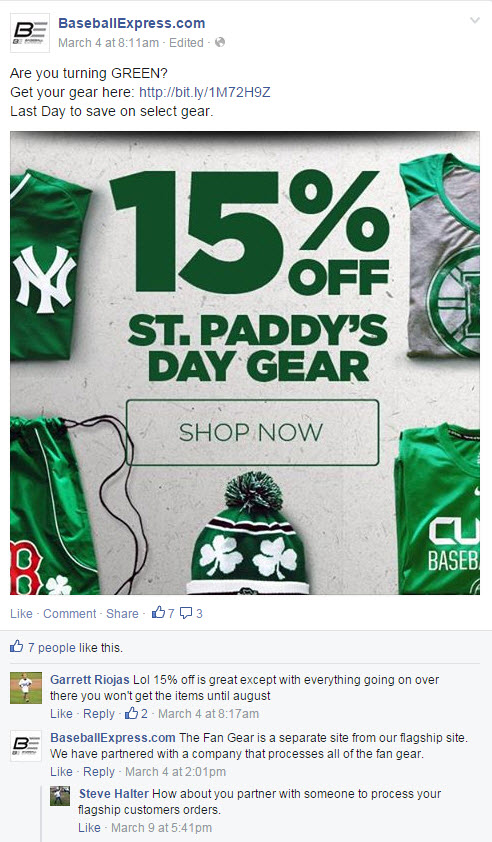How One Online Store Was So Bad At Social Media, Its Customers Thought They Went Out Of Business
Here’s a case study into the community management side of social media. It’s about a retailer that botched its response to an order processing issue so badly that customers actually thought they had closed up shop and gone out of business.
For your consideration: Baseball Express.
As a baseball equipment retailer, you’d expect it would be pretty busy around this time of year. You’d also expect it to be pretty careful about anything that could sour its reputation online and dissuade people from shopping. In reality, not so.
How did the company make customers think it actually went out of business? By playing ostrich with customer support.
How it started

According to its Facebook page, Baseball Express rolled out a new order processing software this spring and it has taken more than a month to iron out the bugs. That has led to orders sitting in the warehouse for weeks, with no system to move the orders or inform customers of progress. That’s a huge issue in the middle of peak season, but it’s not insurmountable — especially if you have someone manning your social media.
But that’s where Baseball Express starts botching things.
Simply put, they failed to directly address customer complaints. They just ignored customers. If you’re wondering, that doesn’t ever work. Ever. Three out of four online consumers expect brands to reply to negative feedback on Facebook. When you don’t post back, they either think there’s nobody actually manning the ship or they think you just don’t care.
And according to Edison Research, Facebook reigns as the most influential social network in ecommerce. Not only is failing to directly address a customer support issue on your page going to ruin your relationship with that customer, it’s going to send other potential customers elsewhere to shop.
So what happened?
Botch #1 – They didn’t get in front of the problem
This is where online marketing meets public relations. Baseball Express didn’t acknowledge the problem until the groundswell of angry customers forced them to.
Full disclosure, I follow Baseball Express on Facebook (I’m a former employee), and the EdgeRank from the number of angry customers commenting on an unrelated post caused this issue to pop into my personal feed. It’s bad when a post about sliding shorts turns into an impromptu gathering place for an angry mob.
Knowing that the company was rolling out a processing system upgrade, it easily could’ve gotten out in front of this. Instead, it had to become reactive rather than proactive.
Botch #2 – Didn’t get in front of the problem again
It isn’t the end of the world if you aren’t able to get out in front of an issue, but that just means that your reaction has to be that much better.
Baseball Express’s response in February was 102 words with a link to an order checking page and reassurance that the issue would be resolved within the week. With baseball season about to start, that timeliness is important.
Problem is, numerous customers complained about the order checking page not working, and things weren’t fixed within a week. It wasn’t until the following Tuesday that Baseball Express re-posted the exact same post, with the exact same “by the end of the week” promise. It failed to provide a timely update to the first post.
In the meantime, the page filled up with negative comments and reviews.
Botch #3 – Hiding negative sentiment, interacting with positive sentiment
Another week passed and nothing was fixed, so Baseball Express posted a third time about the issue (and copy-pasted it again for a fourth time), this time finally explaining a little more, but ending it by referring customers to its phone and e-mail support and saying that the Facebook staff isn’t actually able to help.
The post again filled up with mostly irritated customers upset about late orders and no updates.
Instead of addressing the posts (how hard is it to just give a CSR access to Facebook?), or even just shutting everything down for a bit, Baseball Express suddenly disabled fans’ abilities to post to its page, hid all reviews and deleted negative sentiment posts.
For a brand, there’s no better way to tell someone you don’t care about them than by literally deleting their concerns off your page.
And to make matters worse, Baseball Express “liked” comments that weren’t critical.
Botch #4 – Poor customer support overall
When your Facebook page gives the kissoff to customers and says “call us or e-mail us instead,” you’d better be ready to back that up. Instead, customers flooded social media with posts like this:
Botch #5 – They continued to sell product
While all of this was going on — while Baseball Express was explaining that it couldn’t respond to customers on Facebook and that the staff was working around the clock to fix the issue — the brand still managed to schedule posts pushing product.
Product that, presumably, wouldn’t leave the warehouse for a few weeks.
It doesn’t have to be that hard
All of this could have been avoided if Baseball Express simply took some of that effort scheduling product posts, hiding negative sentiment and producing blogposts and directed it toward its customers.
We’ve heard it ad nauseum, but it’s true. Social media is all about having that “conversation” with the customer, good or bad. Some days it’s talking about why they love the brand. Some days it’s letting them know that, you’re very sorry, but junior might not get his ballglove until after the season starts; here’s a refund if you’d like one.
(That’s a short-term loss, long-term gain. You lose the sale, but you keep the customer.)
If you’re not willing to even handle negative sentiment, social media users can see through that lack of transparency. To the consumer, it looks like cowardice, and it’ll blow up in your face — just like Baseball Express is experiencing now.
If you’re not willing to put in that community management effort and directly tackle negative sentiment on your page, you should probably ask yourself the question: Why are you on social media at all?
Justin Coons
Recent Posts
Recent Comments
- Shannon Thammasiene on How to Create a Successful Blog
- Sarah on How to Create a Successful Blog
- How to Create a Successful Blog on 5 Free Keyword Research Tools that will Rock your Socks
- Olivier Hamphrey on This Week In Social Media
- Richard Dickerson on Use Email to Sell without Selling

